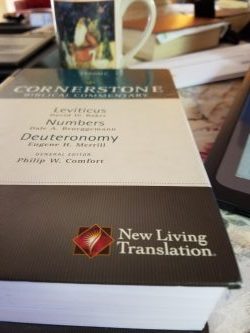Personality and Bible Translation Preference
My post yesterday, titled must personality, is in response to a two part series by Wayne Leman over at Better Bibles. You can check out part 1 and part 2 there, along with a quite substantial number of comments.
Wayne says that his initial thesis, which he presents even though he feels it was disconfirmed, was this:
Those with whom I disagreed with about Bible translation were so set (whoops, sorry, deeply principled!) in their ways. And those with whom I have had some of the most difficult interactions in the past often have scored with a “T” (Thinking) on the Myers-Briggs profile. So I assumed that those who believed so strongly in the value of literal Bible translations and lack of value of idiomatic Bible versions must also be a Myers-Briggs “T”.
I’m wondering, however, if there isn’t still some point to his hypothesis. I’m one of those Ts, though I generally agree with Wayne on Bible translations. But I have an almost compulsive need to read things in their original languages. Even in such languages as Akkadian which I read only with the most tedious effort, I still like to at least check key points of any translation I’m using. Now my limited ability indicates I should probably give more credence to the translation, but I still go look.
Now perhaps many T personalities don’t have the same experience I have had with discovering translations that are literal but misleading. If they don’t have the time, energy, talent, or whatever else it takes to study the original languages, perhaps they would be driven, unlike me, to go to the translation that feels closest from their point of view. I rarely use the NASB, for example, because I can produce that for a passage in a few minutes, and do so regularly as my “working translation.”
On the other hand, even having produced an essentially literal translation, I am often at a loss for English words that express well the thought that I’m sensing in the text. I can go to the [tag]NRSV[/tag] to check my work, so to speak, but to get effective wordings in English I’m more likely to check the [tag]CEV[/tag], [tag]REB[/tag], [tag]NJB[/tag], or [tag]TNIV[/tag], along with a number of others.
It’s just a thought.
PS: For those in the comment thread over at Better Bibles, I haven’t commented because one is required to have a blogger account, and I can’t even remember my ID. Hopefully I’ll find it at some point. I’ve never had a “blogger” blog, but I did at one point have an account.

Henry, I remember you used to comment on BBB a year or so ago, so you must have had a Blogger account then. But you can always get a new account if your old one has died. Actually what you need now is a Google account rather than a Blogger one, so you may need a new one anyone. I think BBB decided on this restriction to avoid proliferation of anonymous comments.
Actually, I have both types of accounts. I just haven’t used them recently, and can’t find the IDs/passwords. They’re around here somewhere and I’ll get back into comments.
I can understand the need for the restriction. My problem here isn’t anonymous comments, but rather the huge percentage of spam. But with strict moderation requirements plus Akismet spam protection, I’ve managed to keep it reasonable.
I have avoided the spam problem in WordPress by requiring simple word verification. Akismet deals with a lot of dubious stuff, and I am left with very little requiring moderation. But things are different on Blogger.
That’s why I have never created a blogger blog. I really like hosting my own. Of course, having several domains on which to do so helps as well.
Well, you can host your own Blogger blog, Adrian Warnock does. But it seems to have all kinds of disadvantages not only over WordPress but also over having your Blogger blog at Blogspot.